|
|
|
Sort Order |
|
|
|
Items / Page
|
|
|
|
|
|
|
| Srl | Item |
| 1 |
ID:
132793
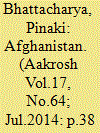

|
|
|
|
|
| Publication |
2014.
|
| Summary/Abstract |
General Boris Gromov, commander of the 40th Army of the Soviet Union, crossed the 'Friendship' bridge linking the Salang Pass on 15 February I989. hack to the motherland. Najibullah. the Afghan president and a Communist protege' of the USSR regime of Mikhail Gorbachev, was ousted from power in April 1992. The intervening three years have a story to tell to the various protagonists of the current Afghan drama being enacted right now as another superpower gets ready to decamp without completing what it set out to do. The Red Army had left in early I989, and its nominee, Najihullah. held on to power for another three years on the strength of the same Afghan army that had desertions, remained fragmented in factional lines - the Parchams and the Khalqis - and was depleted in terms of resources.
|
|
|
|
|
|
|
|
|
|
|
|
|
|
|
|
| 2 |
ID:
132792
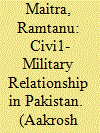

|
|
|
|
|
| Publication |
2014.
|
| Summary/Abstract |
A significant number of countries around the world have been stuck a cycle of military rule followed by civilian rule followed by military rule for decades. The cycle is seemingly unbreakable because both groups, for their own reasons, reject a fully mature political process. Many of the countries with this pattern of governance are located in South America and Africa. But Asia host at least two such nations, densely populated countries of Pakistan and Indonesia.
|
|
|
|
|
|
|
|
|
|
|
|
|
|
|
|
| 3 |
ID:
132795
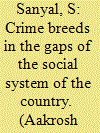

|
|
|
|
|
| Publication |
2014.
|
| Summary/Abstract |
A social system of a country is the baseline and the centre of growth and it acts as a mirror to the development of the nation and its people as a whole. When feelings of unrest, dissatisfaction and being ignored spread from one individual to more people in the same situation. they gradually transgress to bigger groups. having a ripple effect on a particular section of the society. Finally, they emerge into a larger unrest and turbulence, not only bringing in a divide between different regions, slates and communities, but also disrupting the total harmony of the country. Inequality is the main cause of this disharmony, and it can spiral-head from many sources. The simmering uneasiness, if not contained or controlled by the government. explodes into all forms of social turbulence. ranging from class and caste fight to communal riots and internal turbulence. fostering insurgency and a separatist attitude among the people in the country. Regional divide further promotes polarization of a particular section of the society, which then fights for a separate statehood. These are the consequences of an unequal distribution of growth wealth and prosperity. Thereafter, these gaps, differences and inequality are factors which contribute to social dysfuction and become a vital cause of crimes of any pattern
|
|
|
|
|
|
|
|
|
|
|
|
|
|
|
|
| 4 |
ID:
132794
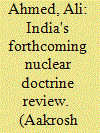

|
|
|
|
|
| Publication |
2014.
|
| Summary/Abstract |
A nuclear doctrine review is on the cards. The BJP having promised in its manifesto that it will conduct a review would likely follow through, in the least to keep up its credibility The last review was done in 2003, when the earlier NDA government adopted the official nuclear doctrine. It is believed that the official, declaratory nuclear doctrine was largely based on the Draft Nuclear Doctrine of I999. While the UPA government that followed did not review (read or revise) the doctrine, this does not imply that it did not keep the doctrine under review. The National Security Advisory Board (NSAB), convened for two years, is tasked to review national security and, as part of this. can be expected to have engaged with nuclear questions. Its output has been kept confidential. Besides, the six monthly meetings of the Executive Council of the Nuclear Command Authority have found mention in the media. Therefore, it will only be fair to acknowledge that a lack of transparency on this score does not imply inaction. It can be inferred from the fact that the declaratory doctrine has not been revised that the UPA government. in both its tenures. either did not think it necessary to revise the doctrine or may have revised the operational nuclear doctrine even while keeping the declaratory nuclear doctrine in place and intact.
|
|
|
|
|
|
|
|
|
|
|
|
|
|
|
|
| 5 |
ID:
132791
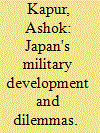

|
|
|
|
|
| Publication |
2014.
|
| Summary/Abstract |
Japan merits serious study as a diplomatic and strategic power in the twenty-first century for several reasons. Although her population size is declining because of shrinking birth rates and restrictive immigration, the ratio of seniors is increasing --with increasing demands for pensions and state-supported safety nets - and the number of younger participants in the growth of her economy and public life is declining, the Japanese people have demonstrated a high degree of discipline and internal social cohesion at times of war, peace and crisis. An example is their fortitude during the recent (2011) nuclear and tsunami disasters. After 1945, her social and political values stress the importance of harmony and consensus building in her domestic arrangements, and the Japanese people and ruling elites value rejection of war as the sovereign right of the Japanese state. For this reason, domestic public opinion matters in the making and orientation of Japan 's external policies following her defeat in 1945 and with the establishment of a pacifist constitution and constitutional democracy. The population is not easily swayed by radical political and nationalistic rhetoric, even though in recent years, nationalist sentiment has grown in Japan and this was signalled by the election of Prime Minister S/2in;o Abe (2012). Still, despite the centre-right tilt in Japanese public and elite opinion in recent years, the Japanese people demand a thorough assessment of new moves to shift strategic policy and constitutional arrangements on defence issues.
|
|
|
|
|
|
|
|
|
|
|
|
|
|
|
|
|
|
|
|
|